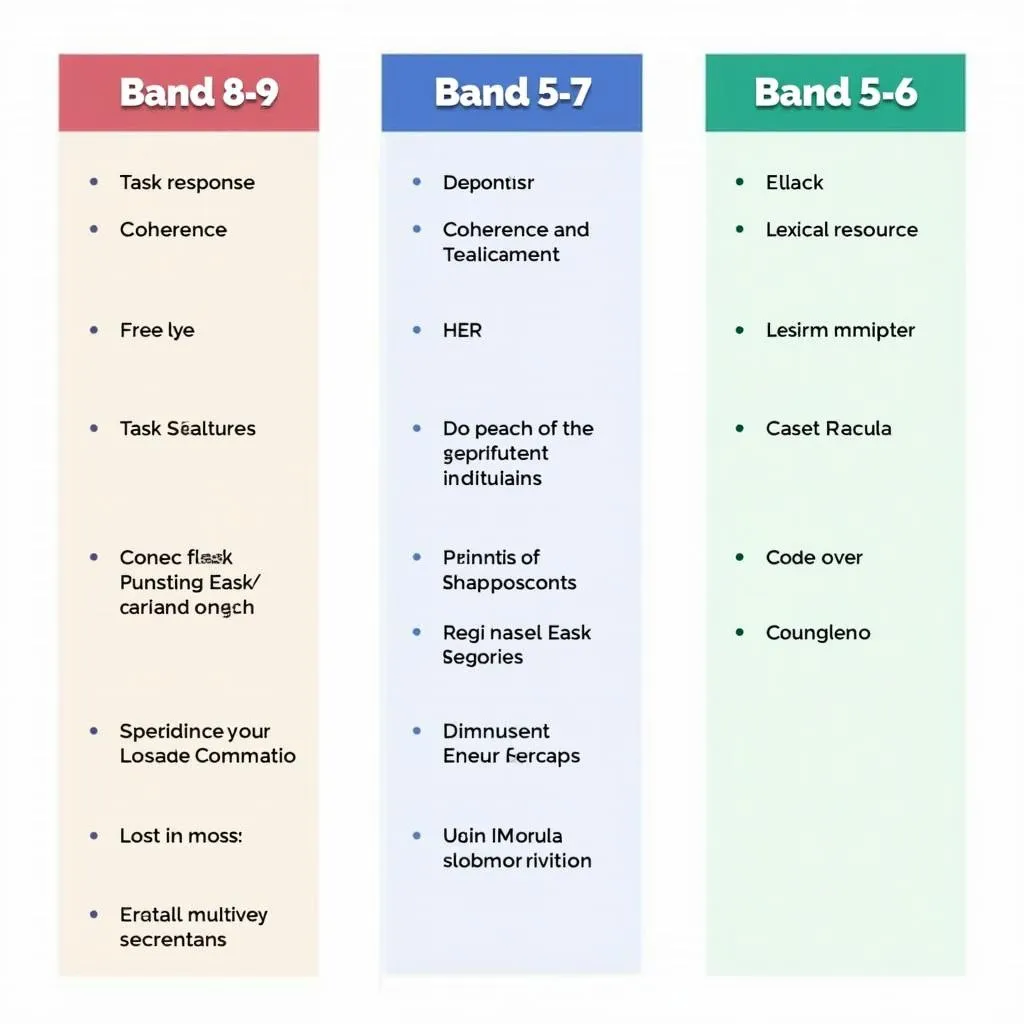The topic of car-free days in cities is becoming increasingly relevant in IELTS Writing Task 2 exams. Based on recent trends, we can expect this theme to appear more frequently in future tests. Let’s examine a related question that has appeared in past IELTS exams:
Some people think that governments should promote car-free days in cities as a way to reduce air pollution. To what extent do you agree or disagree?
Analyzing the Question
This question asks for your opinion on whether governments should encourage car-free days in cities to combat air pollution. Key points to consider:
- The main focus is on government action to promote car-free days
- The purpose is to reduce air pollution
- You need to state your level of agreement or disagreement
- Provide reasons and examples to support your stance
Sample Essay 1 (Band 8-9)
Air pollution is a growing concern in many urban areas worldwide, and various measures are being proposed to address this issue. While some argue that governments should actively promote car-free days in cities as a solution, I partially agree with this approach, believing it can be effective but should be part of a more comprehensive strategy.
On the one hand, implementing car-free days can indeed contribute to reducing air pollution in cities. By temporarily removing a significant source of emissions from urban roads, these initiatives can lead to a noticeable improvement in air quality. For instance, a study in Bogotá, Colombia, showed that car-free days resulted in a 13% reduction in air pollutants. Moreover, such events raise public awareness about the environmental impact of personal vehicle use and may encourage citizens to consider alternative modes of transportation more frequently.
However, while car-free days can be beneficial, they should not be viewed as a standalone solution to urban air pollution. A more holistic approach is necessary to address this complex issue effectively. Governments should focus on developing sustainable urban planning strategies that incorporate efficient public transportation systems, extensive bicycle lanes, and pedestrian-friendly infrastructure. For example, cities like Amsterdam and Copenhagen have successfully reduced air pollution and traffic congestion by prioritizing cycling and public transport over private car use.
Furthermore, promoting technological advancements in clean energy and electric vehicles could have a more significant and lasting impact on air quality. Governments could incentivize the adoption of electric vehicles through tax breaks or subsidies, and invest in renewable energy sources to power urban transportation systems. This approach would not only reduce air pollution but also contribute to long-term sustainability goals.
In conclusion, while I agree that car-free days can play a role in reducing air pollution, I believe they should be part of a broader, more comprehensive strategy. Governments should focus on sustainable urban planning, investment in public transportation, and promotion of clean technologies to create lasting solutions to urban air pollution problems. By combining short-term initiatives like car-free days with long-term structural changes, cities can work towards cleaner air and improved quality of life for their residents.
(Word count: 339)
 Car-free day in a bustling city center
Car-free day in a bustling city center
Sample Essay 2 (Band 6-7)
Air pollution is a big problem in many cities, and some people think that governments should encourage car-free days to help solve this issue. I agree with this idea because it can help reduce pollution and make people more aware of environmental problems.
Firstly, car-free days can really help to reduce air pollution in cities. When cars are not allowed on the roads for a day, there are fewer emissions and the air becomes cleaner. This is good for people’s health and the environment. For example, in Paris, they have car-free days, and they found that air pollution levels dropped by 40% on those days. This shows that it can be an effective way to improve air quality.
Secondly, having car-free days can make people think more about how they travel. When people can’t use their cars, they have to try other ways of getting around, like walking, cycling, or using public transport. This can help them realize that they don’t always need to use their cars for every trip. It might encourage some people to use these alternative methods more often, even on regular days.
However, there are some problems with car-free days. Some people might find it difficult to get to work or do their daily activities without a car, especially if public transport is not very good in their city. Also, businesses might lose money if customers can’t reach them easily on these days.
In conclusion, I think governments should promote car-free days in cities because they can help reduce air pollution and make people more aware of environmental issues. But they should also improve public transport and consider the needs of different people when planning these events. This way, car-free days can be more successful and have a bigger impact on reducing air pollution in cities.
(Word count: 295)
Sample Essay 3 (Band 5-6)
Air pollution is a big problem in cities, and some people think the government should make car-free days to help. I agree with this idea because it can make the air cleaner and help people think about the environment.
First, when there are no cars on the roads, the air gets cleaner. Cars make a lot of pollution, so if they don’t drive for one day, it helps the air. This is good for people’s health and for the environment. In some cities that have tried this, they saw that the air was much better on car-free days.
Also, car-free days can make people think about how they travel. When people can’t use their cars, they have to walk, ride bikes, or use buses. This might make them realize they don’t always need to drive. Some people might start using these other ways to travel more often, even on normal days.
But there are some problems with car-free days. Some people might find it hard to get to work or do important things without their cars. Also, some shops might lose money if people can’t drive to them.
In conclusion, I think car-free days are a good idea for cities. They can help make the air cleaner and teach people about pollution. But the government should also make sure there are good buses and trains for people to use on these days. This way, car-free days can work better and help reduce air pollution more.
(Word count: 237)
Explanation of Band Scores
Band 8-9 Essay:
- Fully addresses all parts of the task with a clear position
- Presents well-developed ideas with logical organization
- Uses a wide range of vocabulary accurately and flexibly
- Demonstrates a wide range of grammatical structures with full flexibility and accuracy
- Uses cohesive devices effectively
Band 6-7 Essay:
- Addresses all parts of the task, though some parts may be more fully covered than others
- Presents relevant main ideas but some may be inadequately developed
- Uses an adequate range of vocabulary with some inaccuracies
- Uses a mix of simple and complex sentence forms with some errors
- Has adequate paragraph organization but may lack overall progression
Band 5-6 Essay:
- Addresses the task only partially; format may be inappropriate in places
- Expresses position but development may be limited, repetitive or unclear
- Uses limited range of vocabulary; errors may cause some difficulty for the reader
- Uses only a limited range of structures with only rare use of subordinate clauses
- May lack coherence and use repetitive cohesive devices
 IELTS Writing Task 2 Band Score Comparison
IELTS Writing Task 2 Band Score Comparison
Key Vocabulary to Remember
- Promote (verb) /prəˈməʊt/ – to encourage or support something
- Air pollution (noun) /eə pəˈluːʃn/ – contamination of the air by harmful substances
- Implement (verb) /ˈɪmplɪment/ – to put a plan or system into action
- Initiative (noun) /ɪˈnɪʃətɪv/ – a new plan or process to achieve something or solve a problem
- Holistic (adjective) /həˈlɪstɪk/ – considering the whole of something rather than just a part
- Sustainable (adjective) /səˈsteɪnəbl/ – able to continue over a period of time without damaging the environment
- Incentivize (verb) /ɪnˈsentɪvaɪz/ – to encourage or motivate someone to do something
- Infrastructure (noun) /ˈɪnfrəstrʌktʃə(r)/ – the basic systems and services that a country or organization needs to function properly
In conclusion, the topic of car-free days in cities is likely to remain relevant in IELTS Writing Task 2. To prepare for similar questions, practice writing essays on related themes such as:
- The effectiveness of public transportation in reducing urban pollution
- The role of city planning in creating sustainable urban environments
- The impact of personal vehicle use on climate change
We encourage you to practice writing your own essay on the given topic and share it in the comments section for feedback and discussion. This active practice is an excellent way to improve your IELTS Writing skills.


